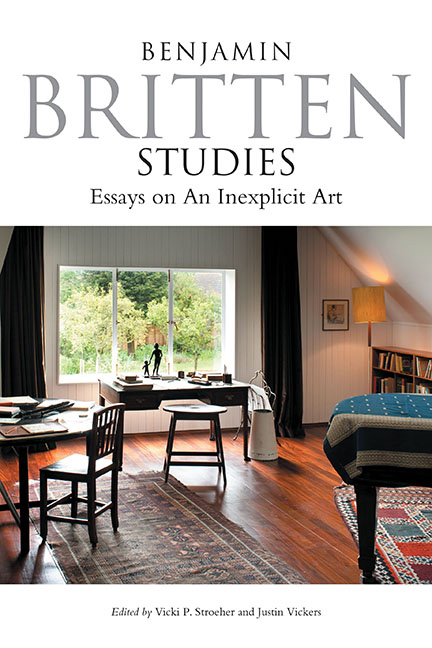Book contents
- Frontmatter
- Dedication
- Epigraph
- Contents
- List of Illustrations
- List of Musical Examples
- List of Tables
- Notes on Contributors
- Acknowledgements
- Bibliographic and General Abbreviations
- Editors’ Preface
- Introduction: Writing About Britten
- Part I Identity: Exile and Return
- Part II Britten and Intimacy
- Part III Britten and His Craft
- Part IV Britten and Matters of Practicality
- Conclusion and Epilogue
- Works Cited
- Index
Editors’ Preface
Published online by Cambridge University Press: 25 October 2017
- Frontmatter
- Dedication
- Epigraph
- Contents
- List of Illustrations
- List of Musical Examples
- List of Tables
- Notes on Contributors
- Acknowledgements
- Bibliographic and General Abbreviations
- Editors’ Preface
- Introduction: Writing About Britten
- Part I Identity: Exile and Return
- Part II Britten and Intimacy
- Part III Britten and His Craft
- Part IV Britten and Matters of Practicality
- Conclusion and Epilogue
- Works Cited
- Index
Summary
On 12 November 1960, the BBC Third Programme broadcast a roundtable discussion about Britten's opera Billy Budd among its principal actors: E. M. Forster, Eric Crozier, and, of course, Britten himself. The “discussion” was a bit of radio ruse, as Paul Kildea has uncovered. Crozier and Forster were recorded the previous week on 4 November, and Britten and Crozier on 9 November, with Crozier acting as leader for both sessions. Nonetheless, the end product gave the perception of seamlessness. The first part of their “conversation” comes across as rather scripted as the genesis of the work is gradually teased out, but it begins to take on a more lively tone when the question is raised of which medium – novel or stage work – best represents the complexities of Budd's “goodness.” After Forster suggested that all a composer need do in order to show “a good character” is to “give [one] good music,” Britten, whom Crozier had prompted earlier to represent “music” in what was fast becoming a battle of wits between Forster and Crozier, immediately set Forster straight:
I presume by that Morgan you mean not “good” music, because after all one always tries to write music which is good, but you mean music which has good character, which depicts goodness itself. That I think is true; but music is an inexplicit art, and what one person thinks is good doesn't necessarily seem music of goodness to someone else. The same with evil. One can think of lots of examples of that, for instance you yourself, Morgan, have said to me in the past that you have felt the Mozart G minor Symphony to be elegance personified, whereas I feel that it is one of the most tragic and tense pieces which has ever been written.
After Britten said his piece, Crozier moved along to the subject of their collaboration, suggesting that he did not wish to take a side excursion into the notion of music and subjectivity, when, in reality, Forster was not physically present to continue the matter. But Britten's observation that music is “an inexplicit art,” however fleeting in the forty-minute broadcast, hearkens back to one of the most essential aspects of music: its inadequacy as symbolic medium. And yet, Britten's compositions – and particularly those with text – seem to belie this failing.
- Type
- Chapter
- Information
- Benjamin Britten Studies: Essays on An Inexplicit Art , pp. xxv - xxviiiPublisher: Boydell & BrewerPrint publication year: 2017



